SDGs Interviews: Talking Sustainable Cities with Trang Linh Duong

SARAYA is one of Japan’s leading companies that implement the United Nations Sustainable Development Goals (SDGs). This is the eighth chapter of SARAYA’s SDGs interview series telling the story of those behind SARAYA and how they are working to achieve these goals. In this edition, we spotlight Trang Linh Duong, CEO of Saraya Greentek Co., Ltd., growing in Viet Nam, founding a company, and helping improve healthcare and sanitation, while tackling SDG number 11: Sustainable cities and communities.
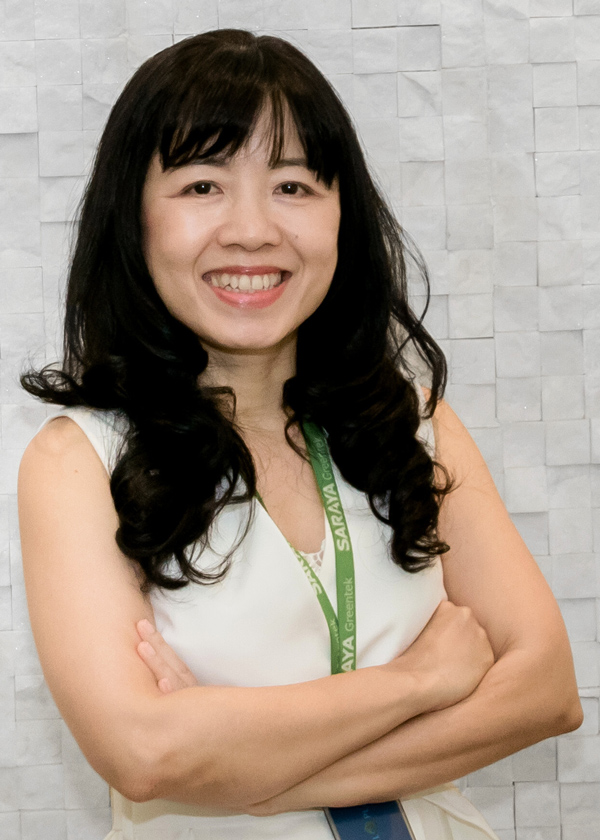 |
|
How did you come to join SARAYA?
In early 2010, my Japanese brother-in-law, Hiroyuki Ishikawa, who had just joined SARAYA in Japan, told me that SARAYA wanted to establish a base in Viet Nam and asked if I was interested in joining their team as their distributor. To be honest, at that time, I had no idea what Saraya's business was all about. I only knew roughly that Saraya was a "soap and detergent manufacturer".
GDP per capita in Vietnam in 2010 was around US$1,318, which was very low compared to other countries in the region such as Malaysia ($9,040), Thailand ($5,076), Indonesia ($3,122)… and compared to Japan, whose GDP per capita back then was already $44,507, so Viet Nam was a long way behind Japan! Realizing that Viet Nam still had a lot of potential for growth and while the concept of hygiene, especially in personal hygiene and food hygiene, was still new to many people in the country at the time, I strongly believed then that SARAYA’s hygienic products and systems could help my people to improve our overall hygienic conditions.
In March 2010, in Ha Noi, I met with Mr. Hojo, who was then in charge of the global operations of SARAYA to express my wish to join the team. Mr. Hojo was concerned that I had no experience in the industry, but he was kind enough to give me a chance to try, provided that I could conduct market research about the potential of Saraya products in the Viet Nam market, including information about the competitors. I accepted his challenge. Three months later, I went to Osaka to meet with Mr. Saraya, the Company President, and other Executives at Saraya headquarters to present my market research report on the four business segments that Saraya has. After my presentation, Mr. Saraya shook my hands and said: “We want to work with you. And if we are happy with your performance in the first year, we will have a joint venture with you.” That is how I started working at SARAYA.
Coming back to Vietnam, I lodged an application to establish a new company, called Greentek Co., Ltd., with the company slogan: “Helping to make a better world”. Greentek means “green technology”, representing my dream to help the Vietnamese people to have a better place to live under “green technology” coming from Japan. The license was issued on 27/08/2010.
Initially, I set up an office on the first floor of my mother’s house where I worked by myself to obtain the necessary licenses in order to sell SARAYA medical products in Viet Nam. I was new to the industry, so there were a lot of things that I needed to learn quickly about the business, including all legal and sale-related matters. For registration of medical products, namely hand sanitizers, even legal firms in Ho Chi Minh City could not give me clear answers regarding what kind of licenses that we needed in order to import and sell the products. So, I contacted the Ministry of Health directly for guidance. After 5 months of lodging our applications, with many subsequent submissions of additional documents and information as per the M.O.H’s requests, eventually, I managed to attain the necessary licenses for all of our hand sanitizers. All licenses were ready, I moved the office to an office building, recruited sales and admin staff, and officially started to launch Saraya products in the market in April 2011. I was fortunate enough to receive help from friends, who were already doing business with hospitals. They taught me about how to sell and supply our products to hospitals through the tendering process.
After a year of operation, and based on our performance, Mr. Saraya decided to set up a joint venture with Greentek. Unfortunately, as it is a foreign-invested trading company, the process to obtain the JV license took almost one year. Eventually, the business license for SARAYA Greentek Co., Ltd. (SGT) was issued on 09/08/2013. (August seems to be my “destiny number” as not only was I born in August, but also Greentek and SGT licenses were issued in the same month!!!).
Could you tell us about your background?
I was born in a family of 5 children in Ho Chi Minh City, formerly known as Sai Gon, the southern part of Vietnam. I am the second child of the family with three sisters and one brother. My father was a mechanical engineer working for an American company, then later on he set up a galvanizing factory in Sai Gon before 1975.
When I was 6 years old, after I finished year 1 at school, our family moved to the countryside to proceed with our plan to leave Viet Nam by boat, but our plan failed. Also, because of this plan, my study was interrupted for 4 years, so was my other brother’s and sisters’. In other words, I didn’t go to school from year 2 to year 5 as there was no school in the area where we lived in the countryside.
So, when our family moved back to Saigon, I had to “jump” class to year 6 to catch up with other children of the same age.
Going back to school, I was like a sponge that quickly absorbed the knowledge that I was given in my class. For the whole junior high school years from the 6th grade to the 9th grade, I always gained either first or second place in my class and was among the top 3 students of the school, averaging a score of 95% across all subjects. Back then, I wanted to follow the academic route that many members of my father’s family (from the north of Viet Nam) did. In our history since the 15th century, we had many family members who graduated first and second class with honor from the first University of Viet Nam, Quoc Tu Giam, serving the Emperors under different dynasties. I never thought that I would become a businesswoman one day!
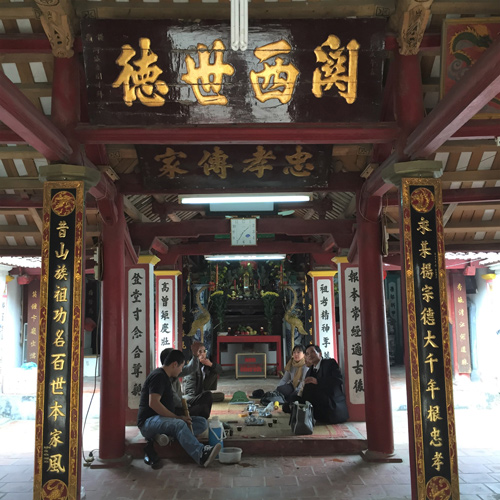 |
| Duong family temple in Vinh Phuc province, north of Viet Nam. |
When I was 8 years old, my father started to teach us English at home with the hope that one day English would help us to have a better life, opening our eyes to the world, and later on, thanks to my father’s lessons, I was always ahead of other students at school when learning English by the age of 12, with an average score of 98%.
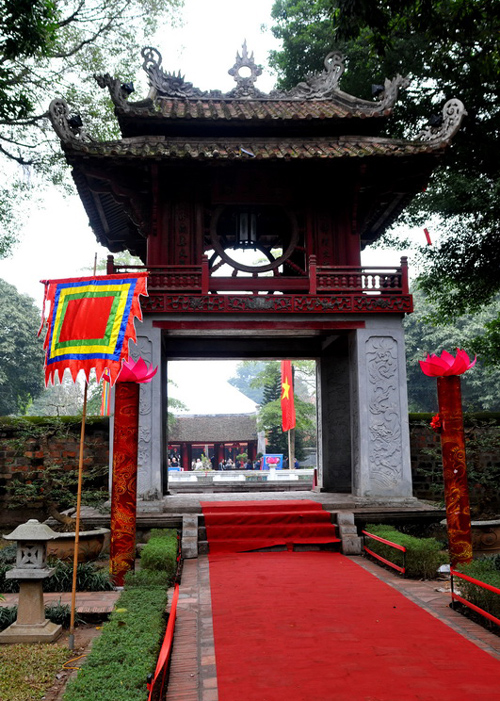 |
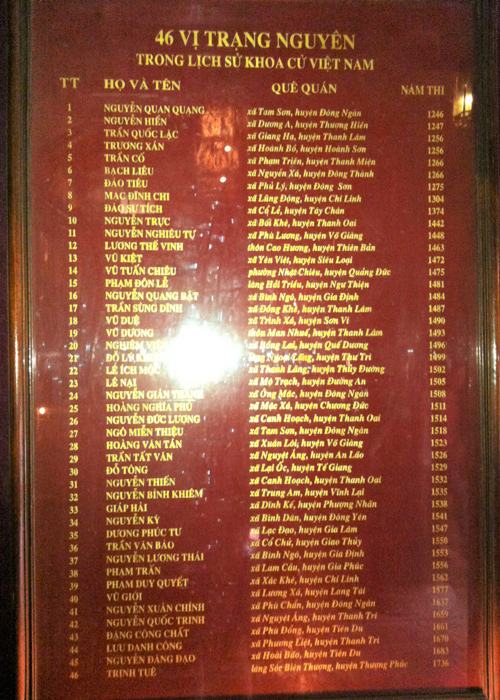 |
| Quoc Tu Giam, the first university of Viet Nam, located in Ha Noi. |
List of 46 first-class graduates with honor from the 13th to 18th century. |
I wanted to become a teacher. At the age of 6 to 8 years old, I used to gather the children in my neighborhood and pretended to have a classroom. Somehow I managed to get other kids to listen to what I said.
When I was 19 years old, my father died of a stroke. My mother was just 42 and became a single mother with 5 young children. She never got married again.
I completed my university course in education, majoring in English in Vietnam in 1994. Upon graduation, I joined an Australian-based architectural and property development company as an assistant to the project manager. Doing this, I gave up my dream of becoming a teacher as I could not earn enough from this career to help my mother to support our family.
In 1998, the company sent me to Australia to be trained at their headquarters with the intention to promote me as the chief representative officer of their operation in Vietnam. While working in Australia, I completed my university course in business studies, majoring in finance. I took classes after work in the evenings and graduated in 8 years.
What was your profession before you joined SARAYA?
I got married in Australia in 2000. In 2003, my husband and I established Norstone Pty, Ltd., which is a trading company in natural stone products used in the construction industry, outsourcing stone products from different suppliers in Vietnam and selling them in Australia. In 2007, I went back to Vietnam and have lived there full time since.
In the same year, we built a factory in Binh Duong province in the south of Vietnam to process the stone that we outsourced directly from different quarries in Vietnam, exporting to different markets in the world, including the Middle East, Australia, North America, and Europe. The business is still operating now under my family’s management, providing jobs to more than 100 workers, I still hold the position of a chairperson and financial controller of the company.
Needless to say, all the experience that I have gained from different things that I have done in my life has helped me a great deal in what I am doing currently.
What is your role at SARAYA? Could you tell us about your trajectory?
I started out as the CEO of my own company, Greentek Co., Ltd., the company that I set up to conduct Saraya business in August 2011. In 2013, I officially joined the Saraya group as the CEO of SARAYA Greentek Co., Ltd. (SGT), a Joint Venture between Saraya Hong Kong Co., Ltd. and Greentek Co., Ltd.
We first started with food sanitation and consumer goods (mainly arau baby), then later on we launched public hygiene products, and lately medical hygiene products. As the concept of hygiene, particularly in the food processing industry, is still quite new to the country from the early days until now our strategy is selling products as “a package”, which includes our products, dispensers, and technical supports (including technical training onsite). This is in fact the concept of selling a “solution” rather than a “product” itself. With this strategy, we have managed to gain many loyal customers for our products and services for many years.
I will never forget the happy moments when I sold 4 units of GUD-1000, an automatic hand sanitizing dispenser, to a customer in Vietnam for the first time. It was only one week after I started the business at my mother’s house. This customer found Saraya dispensers and our company registration details online, then they called me to order the dispensers. Vietnamese people like Japanese products as they are reliable, however, I had nothing in stock then. To make this sale, I immediately contacted SARAYA Japan and had those dispensers shipped by air, and delivered them to our customer as soon as they arrived by motorbike (by the way, the most popular transportation in Vietnam is motorbikes). A dispenser was sold for about US$100, and the air freight was around the same cost. So, we made no money on this sale, but I was so happy as we had the first customer! This company still remains as our customer. The director usually calls me directly when he needs to place an order, or when he has any questions about food hygiene.
I also remember the bad moments when a customer returned Smart San hand soap H-1 to us because of the “unpleasant smell”. Later on, I found out that this customer was just not familiar with the natural odor of the raw materials of this hand soap as they were so used to the strong perfume of other competitors’ products. Ever since our team has been trying to explain to our customers about SARAYA’s efforts to protect the users’ health and the environment by using plant-derived ingredients in our product formulations. Gradually, we have made them understand and accept the non-fragranced products from Saraya. Believe it or not, this educational process took us about 5 years in order to change the consumers’ behaviors! Now, I’m very glad to say that every time a new restaurant opens and needs our products and service, they automatically request non-fragranced detergents, including hand soap from Saraya.
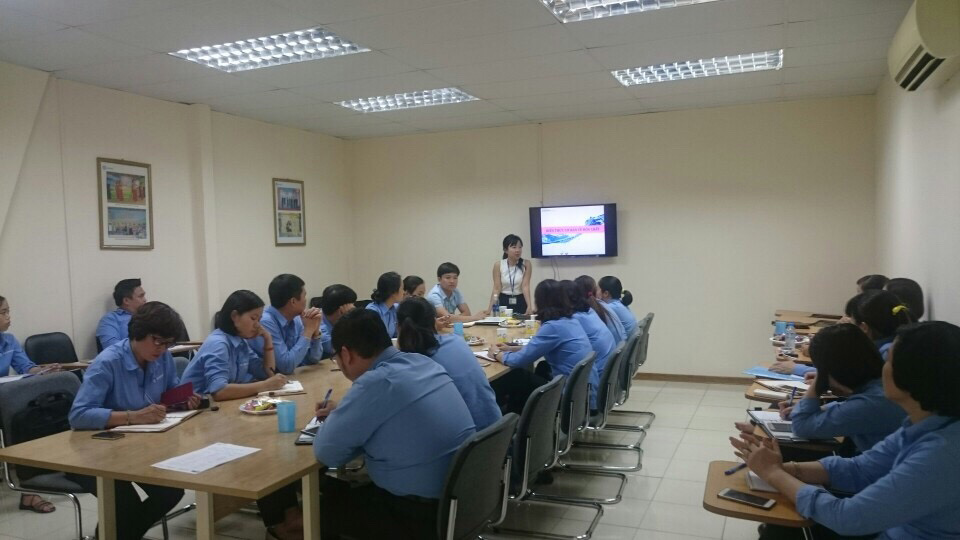 |
| Chemical-use safety training for a hotel chain staff. |
In 2014, when AEON, a big Japanese retailer, built their first shopping mall in Long Bien, Ha Noi, we set up a branch office in Ha Noi city, the capital of Viet Nam, to provide our local supports not only to AEON but also to other customers in the region. We now have 15 staff working in our Ha Noi office, and 30 staff working in the Ho Chi Minh City office.
At SGT, we have a young team who has joined us as fresh graduates from universities and gradually developed their skills during the time they are with us. Because they are young and energetic, we can explore the market in many different ways together. In order to encourage initiatives from young employees, particularly the engineers, we created a flat management system where all new ideas and opinions for improvement can be heard and practiced. They work in teams as everyone’s strength is different: Some are good at sales while others are good at technical support. So together we try to keep a good balance of skills among the members in each team to ensure that the sale targets can always be achieved. We have also set incentives for all teams depending on their monthly and yearly performance to encourage each individual member of the teams to try their best in whatever they do.
I always believe that making money is important because we all need to make a living, but making money while enjoying what we are doing is a lot more important. I want to see our members happily going to work every day as they love the jobs that they do. So, we usually set short-term and long-term goals to motivate our staff in many ways. As for me, I always try to inspire my staff in every way that I can so that they can enjoy and be passionate about what they are doing. Our end goal is always: Who we are today must be better than who we were yesterday.
This year, we will celebrate our 10th year anniversary to mark up our journey since the first SARAYA’s products were introduced in the Vietnam market. It is indeed a long journey, but a very enjoyable one. I have devoted all my time, my sweat, and tears to this business, but I have no regrets as I know that my team and I are contributing our part to the well-being of all people around us, including our families, customers, and most of all, our country, Viet Nam.
If you ask: What is our biggest achievement over the last 10 years of business in Viet Nam? I would proudly say: Our team has been helping many customers in Viet Nam to set up and maintain new hygienic standards and systems to improve their overall hygienic conditions. And also through many activities that we are doing and will continue to do so in the near future for the communities, such as an organic vegetable project, school education projects, plastic waste control project, etc., we will continue to contribute our part to make Viet Nam a better place to live.
SDG 11 aims to make cities inclusive, safe, resilient and sustainable. What role does Saraya Greentek play in achieving this?
Even though Vietnam is achieving rapid economic growth compared to other countries in the region, together with an emerging middle class, it is still a developing country that requires a lot of improvements. The current population is almost 98 million people with an increase of around 1% each year. Almost 40% of the population is under the age of 25 years old, and around 46% of the population are under the prime working-age group. Vietnam is a very young nation, which is indeed thirsty for knowledge and education in order to improve our living conditions.
For this reason, at Saraya SGT, we always see our main role as an educator in achieving SDGs goals to make our cities safe and grow sustainably. Our education focuses on helping the community to improve their hygienic conditions and the quality of life through many useful activities.
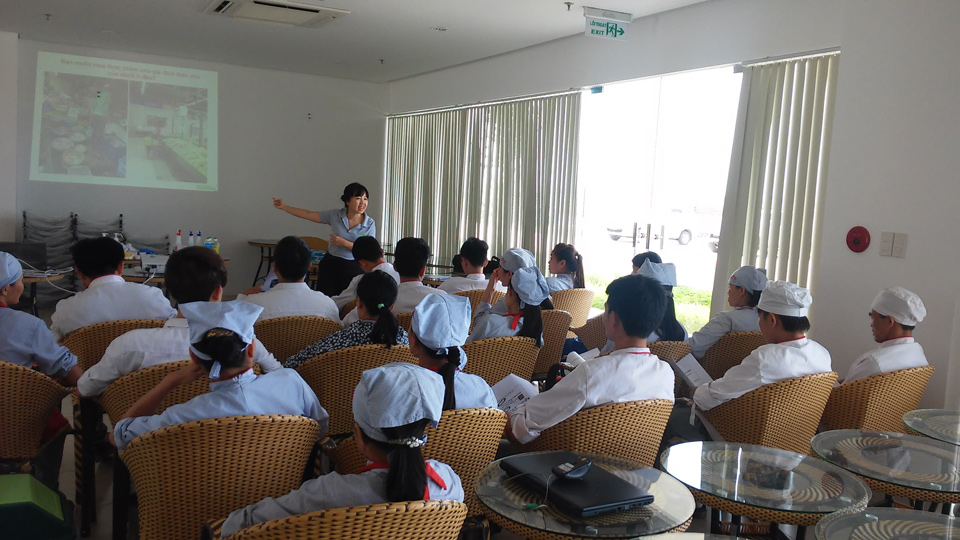 |
| Food hygiene training class. |
The immediate benefits of education that we can bring to our community include poverty reduction, higher income, promotion of equality, environmental benefits, health benefits, and of course, support of the economic growth of the country. Many of these benefits are interrelated in that they work together to improve a person’s conditions in life.
What future plans does Saraya Greentek have regarding that SDG 11?
To be honest, I didn’t know what “SDG” meant before Saraya started the campaign to promote these activities in 2019. But since the early days of our business, our team has been doing the things that we believe are “the right things to do'' for our customers and our country. Only now I realize those activities are all related to SDGs 11, Sustainable Cities and Communities.
Here are some of our current projects which promote SDG 11 at SGT:
- Collaboration with AEON Vietnam on a 5-year project called “Sustainable Education For the Youth'' in Vietnam, starting in 2020. This project promotes sustainable hygiene education for young children (from 3 to 10 years old) at 100 kindergartens and elementary schools across Vietnam. In the first phase of the school year 2020-2021, the chosen topic is “Clean Hands - Strengthen Future” and we promote hand hygiene in the area where AEON Vietnam has a business, ensuring a safe school environment for children during the COVID-19 outbreak and beyond. We are providing the children with basic knowledge of hand hygiene and handwashing, forming good behaviors in them for personal hygiene.
- Organic vegetable project. Since January 2019, SGT has been working with Seeds-To-Table, a Japanese NGO which helps farmers to survive and prosper in Vietnam’s market-oriented economy. We are helping the farmers at Ba Tri commune, Ben Tre province, to introduce their organic vegetables in AEON stores. With this project, in the long term, we aim at stopping the traditional farming practices by the farmers that rely on toxic chemicals. Doing this we encourage sustainable development that permits farmers to be more self-sufficient in a natural way that protects the environment while ensuring a regular income for them.
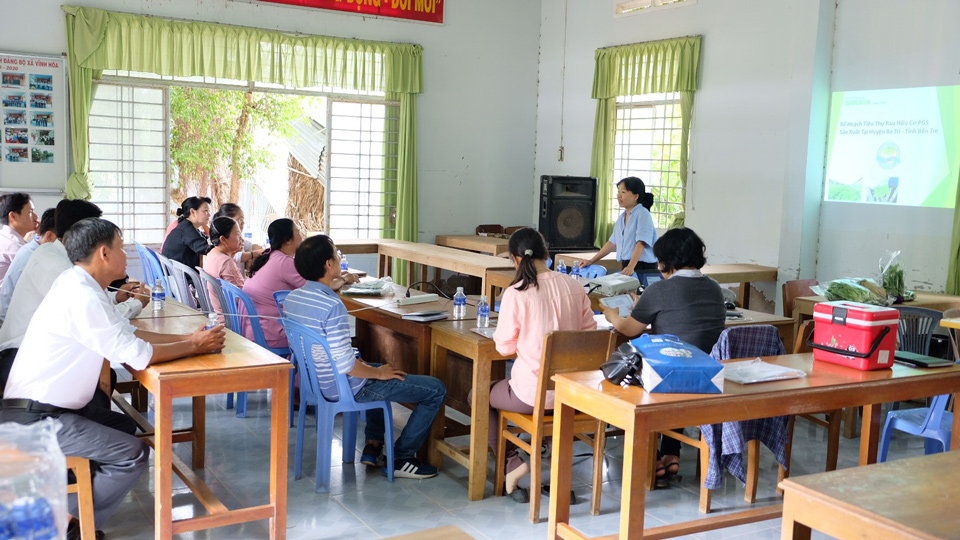 |
| Meeting with farmers in Ben Tre. |
- Educating underprivileged children at orphanages on hand hygiene practice.
- Providing support to leading hospitals in Vietnam with infection control guidelines from Japan in order to improve the hygienic conditions in healthcare settings while saving treatment costs for the patients.
Could you give us some words for the next generation?
I always believe that there are 3 types of people in the world:
- One does not know what is happening
- One knows what is happening
- One makes things happen
It is entirely up to each individual to make himself/herself become who he/she wants to be.
Lastly, if you believe in yourself and be passionate about whatever you are doing, the rewards will come naturally.